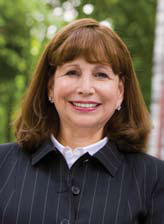A Letter from the President
Dear Friends: It's been a great year for Teachers College-'"and for its new President. Returning to the place that taught me all I need to know about education; renewing old acquaintances and forging hundreds of new ones; working with our talented and dedicated Board of Trustees, our superlative faculty, our tireless staff and our boundlessly energetic and enthusiastic students-'"and all in my native city of New York-'"has been the experience of a lifetime.
The inauguration ceremonies held in January 2007 were incandescent, joyous moments that highlighted the rich legacy of Teachers College and expressed the vibrant spirit and diverse talents of the entire TC community. My thanks to each and every member of that community-'"and many beyond-'"for welcoming me so warmly and sharing your insights, commitment and passion for the College and
all we do.
More importantly, it has been a year when TC took significant steps toward expanding its relationship with the New York City school system; published and introduced into the policymaking arena several important new research studies, ranging in focus from cancer prevention strategies in minority communities to international comparisons of math pedagogy; introduced new scholarships for students; formed closer ties with Columbia University; investigated new educational exchanges abroad; created a social studies curriculum dealing with Hurricane Katrina that will be distributed to educators across the nation; conducted a major research symposium on the federal No Child Left Behind law; and much, much more. Early in 2007, these and many other achievements culminated in our being ranked the nation's top graduate school of education by the editors of U.S.News and World Report-'"a designation based in part on the views of public school superintendents and other education school deans. Almost immediately, we followed that wonderful news by naming a new Provost, Thomas James-'"a noted education scholar who has held education school deanships at the University of North Carolina and New York University-'"and a new Vice President for Finance and Administration, Harvey Spector, who comes to us after serving in the same capacity at the Fashion Institute of Technology.
So there is much to celebrate, yet clearly much more to do in each of these areas if TC is to fulfill its mission of creating excellence and equity in education. We must become a true partner with the city's public schools, both to ensure that principals, teachers and students benefit from the expertise we can offer and that we, in turn, learn firsthand from the people working on the frontlines. We need to increase, significantly, the financial aid we offer students, particularly so that those who wish to pursue careers in urban education and community work can do so unburdened by debt. We must identify and fully realize the appropriate opportunities to collaborate with Columbia, tapping its vast array of academic resources and making available the expertise that only we can provide-'"perhaps most of all in our efforts to conduct educational exchanges with other countries.
Finally, we must continue to improve the quantity and quality of our research, concentrating our talents, resources and commitment on the major questions that surround public education today. Indeed, perhaps the single most important thing we can do as "education experts" is provide people in the field with evidence-based information to overcome the challenges they face every day and at every level of the education system and beyond-'"across psychology, public health, nutrition and all the other fields that TC embraces.
This Annual Report attempts to frame some of the most important of these critical challenges and questions and to show how, at TC, we are attempting to provide answers and solutions-'"or, at the very least, to shape the course
of debate.
- When it comes to closing the education achievement gaps between disadvantaged children and their wealthier peers, what really works? And more specifically: where to commit our financial resources?
- With an increased curricular emphasis on reading and math-'"and on preparation for tests that measure proficiency in these fundamental skills-'"are we losing sight of the importance of other areas of learning? What do the arts contribute to learning, and what place should they have in schools? What about physical education and wellbeing?
- How can education address the urgent need for a stronger sense of citizenship and civic engagement in our society-'"particularly as the U.S. absorbs wave after wave of new immigrants?
- How can we effectively harness technology
in education? - In an age of terrorism, prejudice and fear, how can we make our schools into places that foster cross-cultural acceptance and understanding?
Implicit in these questions is a broad understanding of what education should encompass. Teachers College has embraced this understanding from its inception, and our mission today remains predicated on the belief that student achievement depends on both school and out-of-school community supports. We are engaged on all these fronts, more actively than ever. And while no single institution can provide the answers to these questions, we are producing information that truly does provide real guidance to practitioners and policymakers-'"information grounded in rigorous research in which our methods are determined by the questions we seek to answer and not, as is too often the case, the other way around.
It is this last point that, in my view, is critical. In an age when education mirrors the ideological clashes that have made our country a more divided place, questions of substance will not be resolved by the addition of yet another loud, impassioned voice proclaiming what should be. What's needed, instead, are calm voices that accurately describe what is and what directions seem promising based on research. If we can speak with that kind of authority, then we truly can make the best path more obvious to all and take the ideological rancor out of the debate.
And that, nearly everyone would agree, is an end worth working for.
Sincerely,
Susan H. Fuhrman
Published Wednesday, May. 9, 2007
